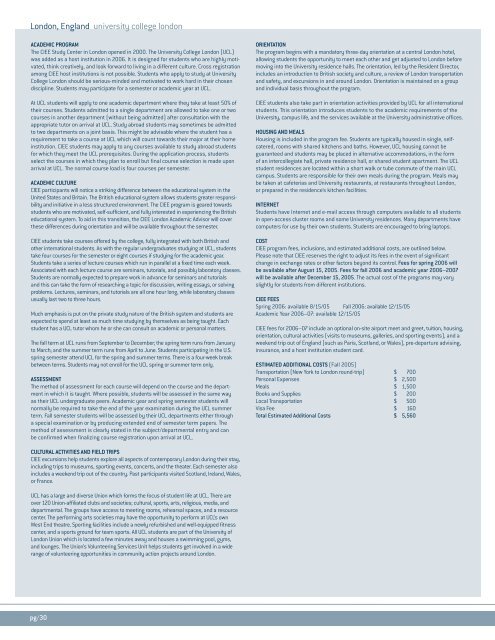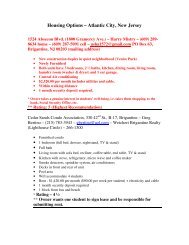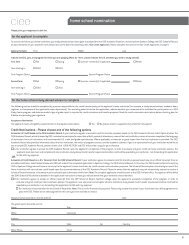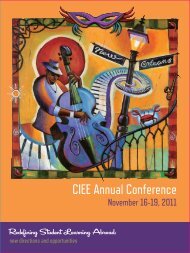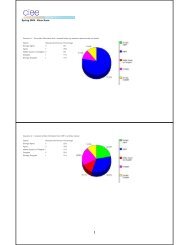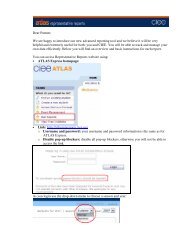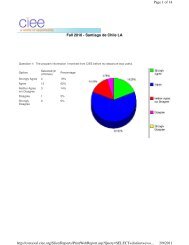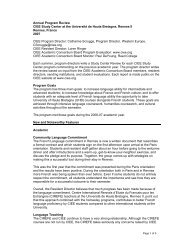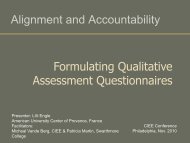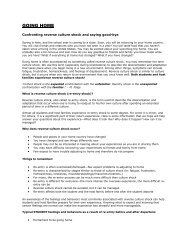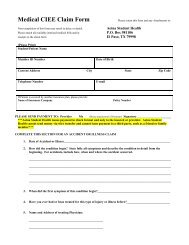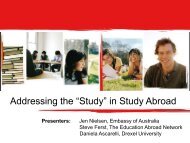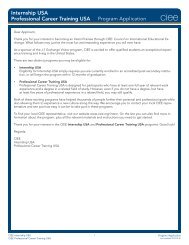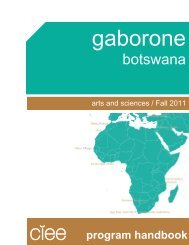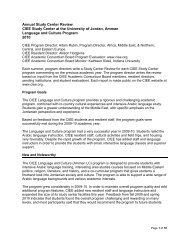studyeurope - Council on International Educational Exchange
studyeurope - Council on International Educational Exchange
studyeurope - Council on International Educational Exchange
- No tags were found...
You also want an ePaper? Increase the reach of your titles
YUMPU automatically turns print PDFs into web optimized ePapers that Google loves.
L<strong>on</strong>d<strong>on</strong>, England university college l<strong>on</strong>d<strong>on</strong>ACADEMIC PROGRAMThe CIEE Study Center in L<strong>on</strong>d<strong>on</strong> opened in 2000. The University College L<strong>on</strong>d<strong>on</strong> (UCL)was added as a host instituti<strong>on</strong> in 2006. It is designed for students who are highly motivated,think creatively, and look forward to living in a different culture. Cross registrati<strong>on</strong>am<strong>on</strong>g CIEE host instituti<strong>on</strong>s is not possible. Students who apply to study at UniversityCollege L<strong>on</strong>d<strong>on</strong> should be serious-minded and motivated to work hard in their chosendiscipline. Students may participate for a semester or academic year at UCL.At UCL students will apply to <strong>on</strong>e academic department where they take at least 50% oftheir courses. Students admitted to a single department are allowed to take <strong>on</strong>e or twocourses in another department (without being admitted) after c<strong>on</strong>sultati<strong>on</strong> with theappropriate tutor <strong>on</strong> arrival at UCL. Study abroad students may sometimes be admittedto two departments <strong>on</strong> a joint basis. This might be advisable where the student has arequirement to take a course at UCL which will count towards their major at their homeinstituti<strong>on</strong>. CIEE students may apply to any courses available to study abroad studentsfor which they meet the UCL prerequisites. During the applicati<strong>on</strong> process, studentsselect the courses in which they plan to enroll but final course selecti<strong>on</strong> is made up<strong>on</strong>arrival at UCL. The normal course load is four courses per semester.ACADEMIC CULTURECIEE participants will notice a striking difference between the educati<strong>on</strong>al system in theUnited States and Britain. The British educati<strong>on</strong>al system allows students greater resp<strong>on</strong>sibilityand initiative in a less structured envir<strong>on</strong>ment. The CIEE program is geared towardsstudents who are motivated, self-sufficient, and fully interested in experiencing the Britisheducati<strong>on</strong>al system. To aid in this transiti<strong>on</strong>, the CIEE L<strong>on</strong>d<strong>on</strong> Academic Advisor will coverthese differences during orientati<strong>on</strong> and will be available throughout the semester.CIEE students take courses offered by the college, fully integrated with both British andother internati<strong>on</strong>al students. As with the regular undergraduates studying at UCL, studentstake four courses for the semester or eight courses if studying for the academic year.Students take a series of lecture courses which run in parallel at a fixed time each week.Associated with each lecture course are seminars, tutorials, and possibly laboratory classes.Students are normally expected to prepare work in advance for seminars and tutorialsand this can take the form of researching a topic for discussi<strong>on</strong>, writing essays, or solvingproblems. Lectures, seminars, and tutorials are all <strong>on</strong>e hour l<strong>on</strong>g, while laboratory classesusually last two to three hours.Much emphasis is put <strong>on</strong> the private study nature of the British system and students areexpected to spend at least as much time studying by themselves as being taught. Eachstudent has a UCL tutor whom he or she can c<strong>on</strong>sult <strong>on</strong> academic or pers<strong>on</strong>al matters.The fall term at UCL runs from September to December; the spring term runs from Januaryto March; and the summer term runs from April to June. Students participating in the U.S.spring semester attend UCL for the spring and summer terms. There is a four-week breakbetween terms. Students may not enroll for the UCL spring or summer term <strong>on</strong>ly.ASSESSMENTThe method of assessment for each course will depend <strong>on</strong> the course and the departmentin which it is taught. Where possible, students will be assessed in the same wayas their UCL undergraduate peers. Academic year and spring semester students willnormally be required to take the end of the year examinati<strong>on</strong> during the UCL summerterm. Fall semester students will be assessed by their UCL departments either througha special examinati<strong>on</strong> or by producing extended end of semester term papers. Themethod of assessment is clearly stated in the subject/departmental entry and canbe c<strong>on</strong>firmed when finalizing course registrati<strong>on</strong> up<strong>on</strong> arrival at UCL.ORIENTATIONThe program begins with a mandatory three-day orientati<strong>on</strong> at a central L<strong>on</strong>d<strong>on</strong> hotel,allowing students the opportunity to meet each other and get adjusted to L<strong>on</strong>d<strong>on</strong> beforemoving into the University residence halls. The orientati<strong>on</strong>, led by the Resident Director,includes an introducti<strong>on</strong> to British society and culture, a review of L<strong>on</strong>d<strong>on</strong> transportati<strong>on</strong>and safety, and excursi<strong>on</strong>s in and around L<strong>on</strong>d<strong>on</strong>. Orientati<strong>on</strong> is maintained <strong>on</strong> a groupand individual basis throughout the program.CIEE students also take part in orientati<strong>on</strong> activities provided by UCL for all internati<strong>on</strong>alstudents. This orientati<strong>on</strong> introduces students to the academic requirements of theUniversity, campus life, and the services available at the University administrative offices.HOUSING AND MEALSHousing is included in the program fee. Students are typically housed in single, selfcatered,rooms with shared kitchens and baths. However, UCL housing cannot beguaranteed and students may be placed in alternative accommodati<strong>on</strong>s, in the formof an intercollegiate hall, private residence hall, or shared student apartment. The UCLstudent residences are located within a short walk or tube commute of the main UCLcampus. Students are resp<strong>on</strong>sible for their own meals during the program. Meals maybe taken at cafeterias and University restaurants, at restaurants throughout L<strong>on</strong>d<strong>on</strong>,or prepared in the residence’s kitchen facilities.INTERNETStudents have Internet and e-mail access through computers available to all studentsin open-access cluster rooms and some University residences. Many departments havecomputers for use by their own students. Students are encouraged to bring laptops.COSTCIEE program fees, inclusi<strong>on</strong>s, and estimated additi<strong>on</strong>al costs, are outlined below.Please note that CIEE reserves the right to adjust its fees in the event of significantchange in exchange rates or other factors bey<strong>on</strong>d its c<strong>on</strong>trol. Fees for spring 2006 willbe available after August 15, 2005. Fees for fall 2006 and academic year 2006–2007will be available after December 15, 2005. The actual cost of the programs may varyslightly for students from different instituti<strong>on</strong>s.CIEE FEESSpring 2006: available 8/15/05 Fall 2006: available 12/15/05Academic Year 2006–07: available 12/15/05CIEE fees for 2006–07 include an opti<strong>on</strong>al <strong>on</strong>-site airport meet and greet, tuiti<strong>on</strong>, housing,orientati<strong>on</strong>, cultural activities (visits to museums, galleries, and sporting events), and aweekend trip out of England (such as Paris, Scotland, or Wales), pre-departure advising,insurance, and a host instituti<strong>on</strong> student card.ESTIMATED ADDITIONAL COSTS (Fall 2005)Transportati<strong>on</strong> (New York to L<strong>on</strong>d<strong>on</strong> round-trip) $ 700Pers<strong>on</strong>al Expenses $ 2,500Meals $ 1,500Books and Supplies $ 200Local Transportati<strong>on</strong> $ 500Visa Fee $ 160Total Estimated Additi<strong>on</strong>al Costs $ 5,560CULTURAL ACTIVITIES AND FIELD TRIPSCIEE excursi<strong>on</strong>s help students explore all aspects of c<strong>on</strong>temporary L<strong>on</strong>d<strong>on</strong> during their stay,including trips to museums, sporting events, c<strong>on</strong>certs, and the theater. Each semester alsoincludes a weekend trip out of the country. Past participants visited Scotland, Ireland, Wales,or France.UCL has a large and diverse Uni<strong>on</strong> which forms the focus of student life at UCL. There areover 120 Uni<strong>on</strong>-affiliated clubs and societies; cultural, sports, arts, religious, media, anddepartmental. The groups have access to meeting rooms, rehearsal spaces, and a resourcecenter. The performing arts societies may have the opportunity to perform at UCL’s ownWest End theatre. Sporting facilities include a newly refurbished and well-equipped fitnesscenter, and a sports ground for team sports. All UCL students are part of the University ofL<strong>on</strong>d<strong>on</strong> Uni<strong>on</strong> which is located a few minutes away and houses a swimming pool, gyms,and lounges. The Uni<strong>on</strong>’s Volunteering Services Unit helps students get involved in a widerange of volunteering opportunities in community acti<strong>on</strong> projects around L<strong>on</strong>d<strong>on</strong>.pg/30


